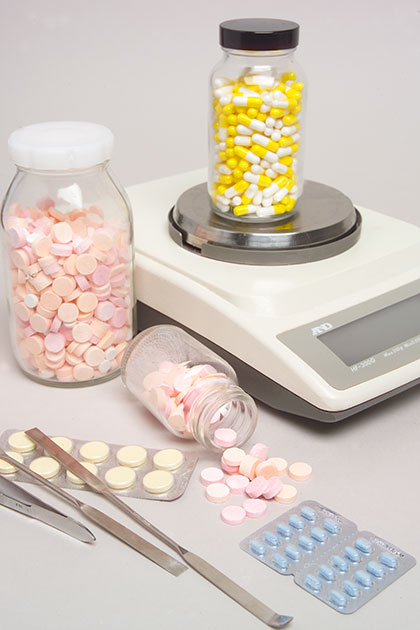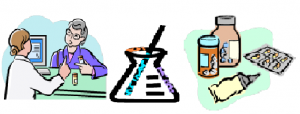
July 22, 2013, by Cerina
Is Pharmacy really just a waste of time?
Some people believe that a pharmacist often appears under the shadow of many other healthcare professionals and it now also appears that Phillip Lee, a leading conservative MP for Bracknell, seems to be one of these people.
A recent article from the PJ online, that I had read a couple weeks ago, detailed the events of the debate on the health expenditure discussed not too long ago. I was surprised to see that the role of a pharmacist was described as a ‘false one.’ He has said that all GPs should instead dispense drugs. But is this really a good idea?! Surely WE are the EXPERTS in medicines and medical treatment.
Over the years, the role of a pharmacist has also expanded from providing a small dispensary service of medicines to being a vital contact in promoting health and well-being as well as providing a variety of healthcare services to the public. This has become evident with services like diabetes and blood pressure screening becoming more readily available in many local pharmacies. These are only some of the reasons as to why I cannot seem to comprehend his statements.
What will follow now are my ideas on the basis of pharmacy and a pharmacist’s role, not just in community but in different working environments.
I believe the roles within pharmacy are primarily endless. Pharmacists can work in several sectors which include: academia, community, industry and hospital.

Pharmacists within academia do not necessarily involve themselves directly in healthcare however; they instead consider the basic grounding of the profession; for example law and ethical issues. This is particularly important during legislation and regulation that GPs would have little knowledge in.
On the other hand; community pharmacists appear to be at the forefront in dealing with various minor ailments as well as dispensing and providing a good quality health service to the local community. Pharmacy in this sector has expanded in order to take a more active role on people’s health. This may benefit GPs saving them time and allowing doctors to deal with more serious cases.
Similarly, hospital pharmacists deal with many of the same issues, many of which are very severe. A patient’s medicines taking history record can be taken of current and previous medications in order to prevent side effects and regulate their medicine intake. What’s important to note here is the fact that, GPs do not have the same expertise in medicines and thus a pharmacist’s role becomes vital in a patient’s healthcare.
I myself have had a vast amount of experience in both community and hospital sector and believe that the subtle differences between the role in the two are reasonably clear and are as important as each other.
Having said this, pharmacists within the industry are in fact not very common although many pharmaceutical companies like GlaxoSmithKline are becoming more globally renowned. In this environment, pharmacists contribute towards the entire journey of a medicine – from the study of its chemical properties to patient adherence. Pharmacists here provide clinical scientists within the industry greater clinical awareness on tasks undertaken.
So all in all, I don’t agree with Phillip Lee opinions. Pharmacy is not only growing but it is also profession that is versatile, applicable and much needed in many sectors of the working industry. Could this be a reason as to why a pharmacist’s role becomes disputed in such a manner? Simple because it has no definite role, but instead includes a variety of responsibilities depending on the work environment?
What do my readers think of this issue and Philip Lee’s opinions on pharmacy? The full article can be accessed on the PJ website by registered readers or paid subscribers.
I would also love to hear from fellow pharmacists or future pharmacists and how you would describe your career role. By exploring the different career avenues in pharmacy, we can help prevent misconceptions and work together. A statement I have taken from the article, made by Martin Astbury (the President of the Royal Pharmaceutical Society), describes this more clearly:
‘We need improved prescribing and concordance — that means more not less integration.’
PharmPower!

Great article Cerina, thank you!
I found the PJ article on Phillip Lee here: http://www.pjonline.com/news/pharmacy_leaders_dismiss_mp%E2%80%99s_views_on_pharmacy.
When I read your article it really struck a chord.
I’ve had to take the last year of the MPharm degree off to recover from an accident I had. During this year, I have worked in a couple of community pharmacies and I’ve got a gauge for what life is like after leaving the comfort zone of University Park!
My experiences have taught me that pharmacists play a vital role in the community, which is the main area under attack from Dr Lee.
For example, I have witnessed an occasion where a GP prescribed medication for child where the dose prescribed was dangerously greater than the recommended dose. If the pharmacist hadn’t have used their medicines knowledge to intervene, the consequences would have been disastrous.
The danger Dr Lee has not addressed, is that if an incident like this occurs within a GP dispensary; there is no clinical check to resolve potential incidents such as this.
From reading the PJ article I found Dr Lee’s points to be somewhat condescending about our profession. Dr Lee perceives a community pharmacist’s role “like counting Smarties”. He then acknowledges that pharmacists are useful when patients “have a multitude of medications”. If Dr Lee spent a day in a community pharmacy, surely he would also know what a useful resource community pharmacy is in providing easily accessible expert advice and treatment for minor ailments?
I think an underlying problem in the community sector is that pharmacists have not had the opportunity to utilise the multitude of skills they are taught in their degree. Nor is there an incentive to do so. Pharmacy needs to prove its worth if it expects to survive and be commissioned new services.
It’s very easy to stereotype community pharmacists as simply dispensing prescriptions. In my experience, they only occasionally have the opportunity perform an MUR or chase up an NMS during a working day.
The Medicines Use Review has offered a glimmer in which pharmacists have been able to use their knowledge of medicines to benefit patients. However, this opportunity has been contorted in some instances by the quality of MUR’s varying and GP’s offering patients “Medicines check-ups”.
Our image also isn’t helped by news such as the recent “Specials Scandal” http://www.telegraph.co.uk/health/healthnews/10133557/Pharmaceutical-scandal-The-NHS-the-drug-firms-and-the-price-racket.html which depicts pharmacists as fraudulent shop keepers.
Dr Lee’s arguments play on the prejudices of pharmacy. I think the way to fight our corner is to eradicate this misconception and demonstrate our value to the public and the NHS.
The way I propose we do this is, is to incentivise community pharmacists not to just dispense huge amounts of prescriptions, but to use their clinical and therapeutic skills to check and enhance GP prescribing.
This will result in better patient outcomes and will save the NHS money.
I also think that at University, other vital skills such as ‘Medicines Management’ should be taught to prepare us pharmacists for the challenges that lie ahead.
I would like to know how Dr Lee conjured up his £400m figure of savings for the NHS if dispensing was moved to GP practices. Surely this is just generating an even greater profit to the pockets of practice owners whilst depriving patients of the resource of a medicines expert?! Who else can advocate their safety and understanding of their medicines?
The time has passed for us all to sit here and do nothing. We need to promote our strengths so that we can work alongside GPs to ensure medicines optimisation and deliver improved patient outcomes that are also cost effective.
We all graduate the MPharm degree as highly skilled individuals. We must not allow ourselves to become deskilled in the community and fulfil Dr Lee’s view of us.
Hi Robert! Thank you for your comment! I appreciate your heads up on this issue! I am sorry to hear that you yourself are not happy with Philip Lee’s comments and his views on pharmacy that no doubt resemble the issues of many others. However, this gives me comfort that I am not the only as well as you who has had so much experience in pharmacy and their roles in healthcare. I hope we can all unite and I do agree that we must not allow ourselves to be deskilled! I like your ideas of introducing modules such as ‘medicines management’ as this would only add to our clinical skills and gives us direct knowledge of what to expect in a pharmacy setting! I believe that the pharmacy degree course has now be revised and modules like these have now been implanted. Having said this I don’t think we have a lack of clinical skills under our belt but it simply may be a case of ‘incentivising’ pharmacists and highlighting their skills!
We cannot let ourselves be brought down. All the best in your future career Robert!
Amazing blog 🙂 I was enjoying it the whole time I was reading it.
By any chance if you want to know more abour Pharmacy Personal Statement you can click in this link, it will surely help you.
http://www.pharmacypersonalstatement.org/
pharmacy personal statement 4
pharmacy school personal statement 3
personal statement for pharmacy school 1
personal statement pharmacy school 1
personal statement pharmacy 1
pharmacy personal statements 1
Thanks for different opinions and insights!